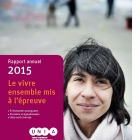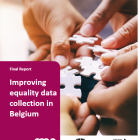Socio-economic Monitoring 2019: labour market and origin
In Belgium, a person's origin is still an obstacle on the labour market. To help change this situation, the Federal Public Service Employment, Labour and Social Dialogue and Unia have jointly developed the ‘Socio-economic Monitoring’. A fourth publication, in line with the three previous ones, has just been published.
The data collected show only a slight improvement. People of foreign origin are still more excluded from the labour market than people of Belgian origin. At this pace, it will take decades before the participation of people of foreign origin in the labour market in our country matches that of people of Belgian origin.
In recent years, progress has been made at the various policy levels. But an integrated approach is necessary to make further progress. The next editions of the Monitoring will be able to measure its impact.
The road to an inclusive labour market without discrimination is still a long one, but the Socio-economic Monitoring can help to take the right policy measures.
What is the Socio-economic Monitoring?
The Socio-economic Monitoring is a tool for analysing individual’s positions in the labour market according to their origin. It is the result of a long collaboration between Unia and the FPS Employment, Labour and Social Dialogue, with the support of the Crossroads Bank for Social Security. In 2013, 2015 and 2017, a first, second and third report have already been published.
This fourth report brings new elements, such as the field of study, an analysis of the labour market at city level, the analysis of three specific groups (the second generation, people of EU origin and people from sub-Saharan Africa) and the analysis of the trajectories of people who have worked under Article 60 contracts.
A wealth of information
You can download the full report on this page.
You can also consult the complete tables of the report, offering additional data and cross-checks, on the website of the FPS Employment.
Comparable publications
Annual report 2020: vulnerable human rights in times of crisis

In this extraordinary year, Unia continued to fight for human rights and equality. The corona pandemic acted like a magnifying glass. Those already in a vulnerable position were often the first or hardest hit by Covid-19 or its measures.
Evaluation of federal anti-discrimination legislation (2017)
Article 52 of the Anti-Discrimination Law states that the application and effectiveness of the anti-discrimination laws must be assessed by the Legislative Chambers. Unia has prepared an assessment report on the Anti-Discrimination Law and the Anti-Racism Law based on its own practical experience, national jurisprudence and its general expertise in the fight against discrimination.
Annual report 2015. Living together put to the test.

The year 2015 left a deep mark on our society. Violent conflicts and tensions on a global scale have had a direct impact on us. As we finalise this annual report, Belgium is suffering the repercussions of the bomb attacks at Zaventem airport and Maelbeek metro station in Brussels.
Data on (in)equality & discrimination in Belgium: results of the project ‘Improving equality data collection in Belgium’ (2021)

"Improving equality data collection in Belgium” (IEDCB) is a Belgian project co-funded by the Rights, Equality and Citizenship (REC) programme of the Directorate-General for Justice of the European Commission. It was realised thanks to a partnership between Unia and the Equal Opportunities Team of the Federal Public Service for Justice. The project aims to improve the collection and processing of equality data in Belgium.
